Posted by Elena del Valle on February 18, 2011
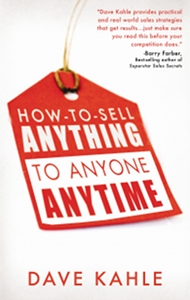
How to Sell Anything to Anyone Anytime book cover
For many years Dave Kahle made his living as a salesperson, claiming a top sales position in the country for two companies in two totally distinct industries. Now he spends his time writing books (he has authored nine books) and sharing his insights and lessons learned with would be sales people.
In How to Sell Anything to Anyone Anytime (Career Press, $14.99), a 240-page softcover book published this year he offers his ideas for simple practices and processes, step-by-step practical tips, and suggestions he believes can help readers be more successful in sales.
The book is divided into 15 chapters covering topics such as simplifying the fundamentals of the selling process, figuring out what the customer wants, making customers comfortable, how to agree on the next step, and follow up.
Kahle believes the sales process is the same regardless of the situation and that those who learn how the process works can make it work for them no matter what they are selling or to whom. He clarifies in the Introduction that the process won’t work every time but that it should work enough times to make it worth learning.
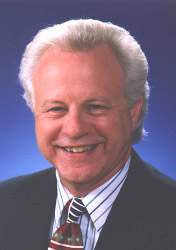
Author Dave Kahle
He says that “…selling is not magic, and there are no secrets. Instead, there are identifiable, understandable, reproducible steps in the process, which when implemented with some degree of proficiency, can be expected to lead to a positive outcome.”
After discussing many people’s ideas and misconceptions about sales he goes on to describe The Kahle Way Selling Process, a six-step process. He explains that although there are steps in the process some of the steps may take place at the same time as others and with different customers.
He emphasizes the importance of going beyond the sale and striving for a relationship. Kahle is the author of 100 multimedia training products, writes a weekly E-zine for salespeople, and has presented in 47 states and seven countries.

Click to buy How to Sell Anything to Anyone Anytime
Comments:
Filed Under: Books
Posted by Elena del Valle on February 11, 2011
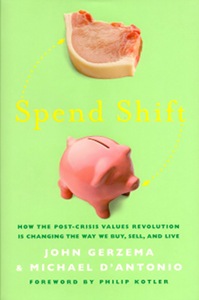
Spend Shift book cover
John Gerzema, a social theorist on consumerism at Young & Rubicam, and Michael D’Antonio, a Pulitzer prize winning author of twelve books, believe the recession is changing people’s values. They think many people are returning to self reliance and focusing on economizing while maintaining a positive attitude.
They interviewed representatives from fifty companies in dozens of communities in eight states and share some of their findings in Spend Shift How the post-crisis values revolution is changing the way we buy, sell, and live (Jossey-Bass, $25.95), a 256-page hardcover book published in 2010.
They concluded, based on their research, that 55 percent of Americans across all walks of life, income levels, political affiliations and geographic locations have embraced this shift in spending values; and that another quarter of adults share that revised focus on values. While Millenials (those born between 1980 and 1998) are at the head of the movement surprisingly almost half of seniors favor the revised spending attitudes.
The informal movement is characterized by optimism, according to the authors. Followers are learning to live with less income while seeking, and in some cases finding, greater satisfaction and happiness than in the past.
The book includes a foreword by Philip Kotler, S.C. Johnson Distinguished Professor of International Marketing, Kellogg School of Management, Northwestern University. He indicates that more than half of our country’s population is adopting the value shifts. He says “They are seeking better instead of more, virtue instead of hype and experiences over promises”; and that “People are looking for value and values.”
The book is divided into an Introduction and eight chapters titled: The New American Frontier: Detroit, Michigan; Don’t Fence Me In: Dallas, Texas; The Badge of Awesomeness: Boston, Massachusetts; An Army of Davids: Tampa, Florida; Block Party Capitalism: Brooklyn, New York; The Quality of the Lion: Las Vegas, Nevada; The Citizen Corporation: Dearborn, Michigan; Innovation Nation: San Francisco, California; and Coda: The Takeaway: Los Angeles, California.
Two thirds of the people who responded to the authors BrandAsset Valuator said they feel they can, through their purchasing habits, have an impact on corporations; supporting companies who share their values and avoiding those with opposite values.
Gerzema, who relies on data to identify social change to prepare companies wanting to adapt to and anticipate consumer demands, is the author of The Brand Bubble. D’Antonio, formerly with Newsday, is the author of Hershey, a biography, among other titles.
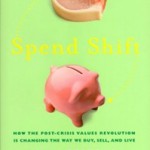
Click to buy Spend Shift
Comments:
Filed Under: Books
Posted by Elena del Valle on February 4, 2011
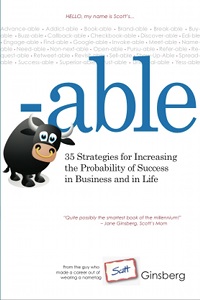
-able book cover
Photos: Scott Ginsberg
Scott Ginsberg, a resident of Saint Louis, Missouri, has been wearing a name tag for ten years in a row. It started out as as a way to teach people how to overcome their shyness and the awkwardness of making the first networking introduction. Along the way, he learned how to be approachable and how to make being approachable profitable.
In his most recent book, -able 35 Strategies for Increasing the Probability of Success in Business and in Life ($19.95), published last year he shares 35 strategies he thinks can help readers increase their probability of success in business and in life. The suggestions are described with sometimes odd seeming phrases such as How to be more findable than a smile at a nudist colony; How to be more referable than an attorney hoped up on sodium pentothal; and How to be more sellable than a case of Coors Light at a Colorado Rockies tailgate party.
Some of the concepts he discusses include the thought that ideas are free and execution is priceless. He believes more is better and advises that readers be “dangerously prolific” and “refuse to slow down long enough for anyone to catch up.” Be fast, produce a lot, push many concepts to fruition and do it consistently, is his advice.

Author Scott Ginsberg
He also believes that not knowing how to do something should not stop readers. Better to move forward than to not move at all; he believes this is true even if you are not sure how or in what direction to move as long as you move. “Otherwise procrastination – the redneck second cousin of patience – will rob you of the motivation you need to carry in the cavalry charge. Finished is the new perfect,” he says.
Ginsberg is the author of twelve books including Hello, my name is Scott, The Power of Approachability, How to be That Guy and Make a Name for Yourself.
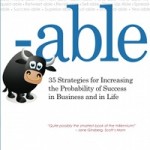
Click to buy -Able
Comments:
Filed Under: Books
Posted by Elena del Valle on January 28, 2011

Photos: Kaplan Publishing
In 2008, there were 2.3 million criminals in jail in United States which was a greater number than any other nation, according to the International Center for Prison Studies at King’s College London. In addition to that every year one million teenagers are locked up in the United States. Over time many of the former teenagers become adult offenders and are sent to jail adding to the already large prison population.
A circuit court judge in Florida’s Unified Family Court says there’s a better way to deal with teenagers who get into trouble. She believes the juvenile justice system needs to be reformed. She shares her ideas through examples from her courtroom in a recently published book Raised by the Courts: One Judge’s Insight into Juvenile Justice (Kaplan Publishing, $24.99).

Raised by the Courts book cover
“Alternatives to imprisoning young people exist that are more effective, less costly, and more humane,” she said. “We don’t need to spend money developing and testing new solutions. We need to support, adopt, and expand access to the many cost-effective programs that have proven to work, such as prevention of child abuse, parent counseling, family therapy, youth court and other diversion services, truancy reduction programs, and many others. Instead of paying for failure, we should invest in success. Our nation’s children deserve our concern and conscientious dedication to their futures and ours.”
The 285-page hardcover book is divided into three sections, Awakening, Despair and Enlightenment; 28 chapters and two appendices about Programs That Work and Online Resources.
The author points out in the Opening Statement of her book that even before the recession began Florida had poor scores in health, human services and education. In 2009, the state ranked forty-fifth in high school graduation rates and personal income growth and forty-ninth in state and local government spending on education yet it was third for spending on incarcerating adults and children. In spite of that she believes the southern state can be proud of having “some of the most progressive, effective juvenile programs in the country.”

Judge Irene Sullivan
At the end of the book she proposes ten principles that should guide the juvenile justice system in the future including: treating adolescents with significant mental health problems at mental health facilities rather than jails; providing gender specific services for adolescents; taking into account maturity levels and brain development when dealing with youth; and identifying at-risk children and families and addressing their situation.
Since 1999 Irene Sullivan has been a circuit court judge in Florida’s Unified Family Court. She is a member of the American Bar Association Commission on Youth at Risk, the National Truancy Prevention Association, the Florida Blueprint Commission to reform juvenile justice, and a statewide task force on Disproportionate Minority Contact.

Click to buy Raised by the Courts
Comments:
Filed Under: Books
Posted by Elena del Valle on January 21, 2011
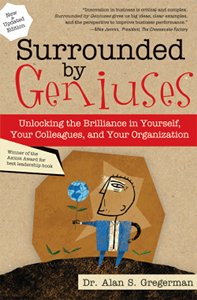
Surrounded by Geniuses book cover
Photo: Sourcebooks, Inc.
In this down economy many people are earning less than they used to and struggling to keep their jobs with employers who take their employees for granted. Smart businesses, some believe, nurture their employees and their abilities. One business consultant believes it is possible and worthwhile to improve business performance, solve problems, and develop the types of new opportunities that provide a company the extra entrepreneurial edge to carry it through in the long term. In his book Surrounded by Geniuses: Unlocking the Brilliance in Yourself, Your Colleagues and Your Organization (Sourcebooks, Inc., $15.99) first published in 2007 Alan Gregerman, Ph.D., a Maryland consultant, shares his ideas on the subject. Last year a softcover edition of the book was published.
The author believes there is genius “hidden within all of us.” Furthermore he is convinced that the genius can be leveraged to “transform any company or organization in order to deliver compelling customer value.” The idea is that people around us are capable of contributing fresh ideas and perspectives that benefit the way we do things. The secret is to look at the ourselves and others in a different way from what we are used to; and to discover genius all we need is the “right insight and the right circumstances,” according to the author.
In the chapter on finding brilliance within ourselves he starts out by recommending that readers figure out what they are passionate about. He uses singing as a way to illustrate his point because singing fascinates him; his suggestion is for readers to “Find the Song in You.” The essence of his recommendation is to identify the concept that inspires you to make a difference and believe that you can make a compelling difference. The road to making a difference, according to Gregerman, is paved with curiosity. He suggests asking questions, finding new ideas, talking to strangers whose ideas appeal to you, getting involved in organizations that are making a difference in your community, developing relationships with new people, and mentoring others.
The 250-page book is divided into three parts, The Context, Ten Journeys and Building a New Model of Success, and 17 chapters. Gregerman is the founder, president and chief innovation officer of Venture Works Inc., a Washington, D.C.-based consulting firm that seeks to help leading companies unlock compelling value for the customers they serve. According to his bio, his clients include Marriott, Lockheed Martin, Discovery Communications and Verizon. A geographer by training, he is also the author of Lessons from the Sandbox.

Click to buy Surrounded by Geniuses
Comments:
Filed Under: Books
Posted by Elena del Valle on January 14, 2011
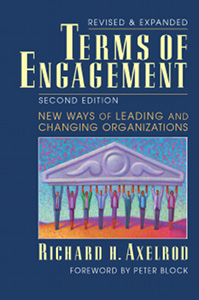
Terms of Engagement book cover
Photos: PeopleSpeak
Richard Axelrod believes corporate change occurs when employees become engaged. He is convinced that common old style top down methods that force employees to participate in change programs have the opposite effect of that desired. Instead of encouraging employees to become engaged in new policies the forced adoption discourages engagement.
In 2000 he shared his ideas in a book, Terms of Engagement. After recovering from emergency triple by-pass surgery and changing his personal lifestyle habits he discovered American Airlines had relied on his principles to save $1.8 billion and turn the company around.
In the second edition of Terms of Engagement New Ways of Leading and Changing Organizations (Berrett-Koehler Publishers, Inc., $29.95), a revised and expanded softcover edition, he dedicates 229 pages to the topic. The new edition includes Questions for Reflection at the end of each chapter to assist readers’ learning. Axelrod also included insights and stories of engagement he gained and summarized from 400 pages of transcript developed after communicating with dozens of people in the process of updating the book.
The book, published in 2010, features a foreword, an introduction and twelve chapters: Why Change Management Needs Changing, Engagement Is the New Change Management, Six Change Management Myths, Lead with an Engagement Edge, Leadership Conversations that Foster Engagement, Widen the Circle of Involvement, Connect People to Each Other, Create Communities for Action, Promote Fairness, When Engagement Disengages: Some Words of Caution Before You Begin, Design Work with Engagement Built In, and How to Start Where You Are.

Richard Axelrod, author, Terms of Engagement
Axelrod, founder of the Axelrod Group, Inc., lists Boeing, British Airways, Corning, Ford, Harley-Davidson, Hewlett-Packard and Kaiser Permanente among his clients. He is the coauthor of You Don’t Have to Do It Alone. He and his wife of 40 years reside in Wilmette, Illinois.

Click to buy Terms of Engagement
Comments:
Filed Under: Books
Posted by Elena del Valle on January 7, 2011

What does the future hold for Cuba now that its famous leader has taken a back seat? Energy resources that allow the Caribbean island nation to improve its economy may be increasingly important in the future and may affect the United States. This is the belief of Jonathan Benjamin-Alvarado, a professor of political science at the University of Nebraska Omaha, and editor of Cuba’s Energy Future Strategic Approaches to Cooperation (Brookings Institution Press, $26.95), a recently published book.
In addition to Benjamin-Alvarado, Jorge Piñon, senior research fellow at Florida International University; Juan A.B. Belt, director of Chemonics International; Amy Myers Jaffe, Wallace S.Wilson Fellow in Energy Studies, Rice University; and Ronald Soligo, Rice scholar, Rice University contributed to the 143-page softcover book.
Benjamin-Alvarado is assistant director of the Office of Latino/Latin American Studies. He is also senior research associate of the Center for International Trade and Security at the University of Georgia. He is the author of Power to the People: Energy and the Cuban Nuclear Program.

Click to buy Cuba’s Energy Future
Comments:
Filed Under: Books
Posted by Elena del Valle on December 17, 2010
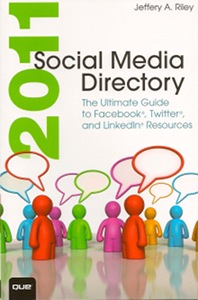
2011 Social Media Directory
Jeffery A. Riley, formerly in the publishing industry, thought it would be helpful to gather a list of companies and organizations with an online presence in the best known social media sites in a book. With that goal in mind he selected what he considers the most important companies and organizations with an online presence on the better known social media sites, Facebook, LinkedIn and Twitter in the 2011 Social Media Directory: The Ultimate Guide to Facebook, Twitter, and LinkedIn Resources (Que Publishing, $19.99). In spite of the title which may give the impression it is a list of social media the book features a list of companies and their social media addresses.
The 296-page softcover book lists 3,000 sources in 15 information categories. Fifteen chapters divided by category list subcategories each one with the name of one or more organizations or companies, a description of each along with the company website and Facebook, Twitter and LinkedIn accounts when available. The main categories are: Business, computers and electronics, current events, politics, education, news, entertainment, health, hobbies, sports, travel, religion, shopping and fashion.
Riley, president, Box Twelve Communications, Inc., a content solutions company, is a former staff writer of the Los Angeles Times. He was involved for 15 years in the information technology publishing industry as copy editor, production editor, development editor, acquisitions editor, executive editor, and author. He is the author of Introduction to OpenOffice.org, and Picture Yourself Learning Microsoft Excel 2010.

Click to buy 2011 Social Media Directory
Comments:
Filed Under: Books
Posted by Elena del Valle on December 10, 2010
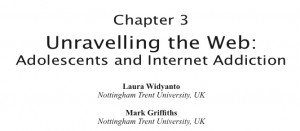
Photos: Mark Griffiths, Ph.D., Joanne Cantor, Ph.D.,
It has become common to see people at a conference presentation while at the same time checking emails or texting on their electronic assistant of choice. Multitasking has become ubiquitous with many people who rely on their technological tools and internet access for work and fun. Many drive, walk, shop, wait in line and so forth while talking or texting. Disconnecting while dining, driving, in the movies, on an airplane or at the grocery store is difficult for some. For many business owners and executives traveling with a laptop or access to the internet, even if the trip is for pleasure, is unthinkable.
Workers spend as much as 40 percent of their time online while at work on non-work related browsing, and make more than half (60 percent) of online purchases during working hours, according to a survey by the International Data Corporation (Snapshot Spy, 2008). As many as 90 per cent of employee respondents to the survey said they felt the internet can be addictive, and 41 percent said they spent more than three hours online per week for personal surfing.
While connectivity and technology provide freedom and enhanced capabilities for millions for some they are the tools or the source of addiction, according to a few expert voices softly surfacing.
Does technological abuse exist? Some believe it does. There are those who distinguish between addictions where addicts use the internet as a means for their addiction and those where the person may be addicted to the internet itself. There is more than one kind of technological or internet abuse according to Mark Griffiths, Ph.D., professor, Nottingham Trent University, in the United Kingdom. In Unraveling the Web: Adolescents and Internet Addiction, a chapter in Adolescent Online Social Communication and Behavior, a book, he and Laura Wydyanto, his co-author of the chapter, address the issue of internet addiction among teenagers.
In a 10-page article, Internet abuse and internet addiction in the workplace, published February 2010 in The Journal of Workplace Learning (Vol. 22 No. 7, 2010 pp. 463-472 qEmeraldGroupPublishingLimited 1366-5626 DOI 10.1108/13665621011071127) he identifies cybersexual internet abuse, online friendship/relationship abuse, internet activity abuse, online information abuse, and criminal internet abuse. He believes internet abuse has the potential to be a serious occupational issue although it has been neglected in research to date.
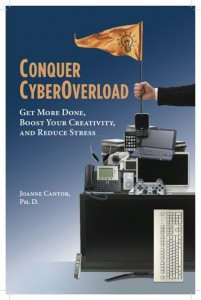
Conquer CyberOverload book cover
In the United States, Joanne Cantor, Ph.D., addresses the topic in Conquer CyberOverload Get More Done, Boost Your Creativity and Reduce Stress (CyberOutlook Press, $12.95), a 92-page softcover book published earlier this year. In 2008, she began doing research for the book and giving lectures based on her findings. In the spring of 2009, after four months of work she completed the manuscript. She said by email that she has received much positive feedback to the book and related presentations.
“I’m getting very favorable reactions to the book, with most people saying how much it relates to their own lives and how useful the tips are. They also find the brain exercises and the recent research interesting and surprising,” said Cantor by email when asked about the success of her book.
The ReStart Internet Addiction Recovery Program in Washington, in its second year of operation, is touted as the first of its kind. It offers a therapeutic retreat center stay of 45 days or longer for adults suffering from internet and video game addiction, according the the company website. An anonymous ReStart Internet Addiction Recovery Program website survey of 14,000 visitors indicates 10.6 percent of respondents acknowledged having a problem with excessive use of the internet and 39.3 percent of respondents were open to the possibility that they may have a problem. Some 27.2 percent of respondents said they suffer impairments in everyday life and interaction with others because of their internet or video game use.

Joanne Cantor, Ph.D., author, Conquer CyberOverload
As a recovering cyber-addict, Cantor believes it is possible to reach a balance between the benefits of healthy use of connectivity and cyberspace and the needs of leading a productive, creative and well rounded life. In her book, she shares strategies that have helped her overcome her former need to be connected.
The book is dived into an introduction followed by five chapters. She starts out by asking some questions to help the reader determine if he or she may suffer from cyber overload. She goes on to discuss the effects of the digital age; why she believes multitasking may be counterproductive; how too much information can decrease creativity; what she considers are the reasons behind cyber stress; and how readers may be able to control their use of technology.
Cantor, president of Your Mind on Media, is outreach director, Center for Communication Research University of Wisconsin-Madison where she was a professor for 26 years.

Click here to buy Conquer CyberOverload
Comments:
Filed Under: Books
Posted by Elena del Valle on December 3, 2010

Iron Butterflies book cover
Photos: Prometheus Books
After spending several years in eight countries and interviewing 50 dynamic women in a variety of careers and jobs Birute Regine, Ed.D., a developmental psychologist, wrote Iron Butterflies: Women Transforming Themselves and the World (Prometheus Books, $19), a book describing the leadership styles and way of thinking of the women she believes are contributing to a social transformation and empowering others.
In the first chapter Regine mentions a Mayan and Mongolian prophecy that foretells the Era of Man ends and the Era of Woman begins this year. She believes the new era will be one of cooperation driven by women’s leadership style that relies on working together for the benefit of a social group. She is convinced that the feminine qualities that for years kept women out of powerful elite circles will drive them to success in the coming years.
Her 299-page softcover book is named for a poem by the same name by Janice Mirikitani. She believes the title reflects the strength, perseverance, resilience, fragility and beauty of the many women she interviewed for the book. In spite of their diverse lives she concluded the women shared five qualities in common. They are vulnerable, revolutionary, healers, strong and welcome paradox.

Author Birute Regine, Ed.D.
She interviewed women who dedicate their time to art, poetry, yoga, healthcare, nursing, politics, customer service, choreography, diplomacy, peacemaking, designing clothes, human resources, writing, teaching, consulting, making wine, running a non profit organization, running a football team, and being a spiritual leader.
A resident of Massachusetts and New Hampshire Regine is also an executive coach, speaker and the co-author of Weaving Complexity and Business: Engaging the Soul at Work.

Click here to buy Iron Butterflies
Comments:
Filed Under: Books





































